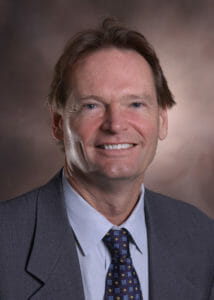
Researchers at the Biodesign Institute at Arizona State University will join a 12-institution consortium to combine forces to develop new treatments that will improve the quality of life and long-term survival for patients fighting malignant brain tumors. The “ReMission Alliance Against Brain Tumors” partnership will be led by UF Health (University of Florida Health).
“We are proud to lead the ReMission Alliance and are emboldened by the strength of our institutions as a united force,” said David R. Nelson, M.D., senior vice president for health affairs at UF and president of UF Health. “We all recognize the dire need to greatly improve treatment options for these patients and we’re confident that a team science approach spearheaded by researchers of this caliber will get us there.”
According to Stephen Albert Johnston, director of the Biodesign Center for Health Innovations, “Through its interactions, the alliance has already begun to amplify our efforts to create diagnostics for the early detection of brain cancer, and therapeutic vaccines needed to treat it.”
“Brain tumors are one of the great unsolved medical challenges of our time,” said Jonathan Licht, M.D., director of the UF Health Cancer Center. “This devastating disease takes some of our most productive and vital citizens in the prime of their lives and therapeutic advances have been at a standstill.
According to UF Health representatives, the group constitutes the largest collective effort focused specifically on advancing safe and effective immunotherapy for children and adults with brain cancer.
In addition to Arizona State University and the UFHealth team, the research collaborative includes:
- Alabama Children’s Hospital at University of Alabama — Girish Dhall, M.D.
- Children’s National Hospital — Eugene Hwang, M.D., and Roger Packer, M.D.
- Dana-Farber Cancer Institute and Broad Institute of MIT and Harvard — Keith L. Ligon, M.D., Ph.D.
- Dana-Farber Cancer Institute — David Reardon, M.D.
- Duke University Medical Center — John Sampson, M.D., Ph.D.
- MD Anderson Cancer Center — Amy Heimberger, M.D.
- Nationwide Children’s Hospital — Mohamed Shebl AbdelBaki, M.D.
- Sanford Burnham Prebys Medical Discovery Institute — Robert Wechsler-Reya, Ph.D.
- Stanford Medicine — Gerald Grant, M.D., and Sanjiv Gambhir, M.D., Ph.D.
- University of Toronto Hospital for Sick Children — Michael D. Taylor, M.D., Ph.D.
A 10-year, $100 million fundraising commitment by the University of Florida was announced at the 2019 ReMission Summit to underwrite the audacious goals of this expansive collaboration, which will conduct leading-edge preclinical investigations and develop collaborative and innovative immunotherapy clinical trials incorporating state-of-the-art approaches in the treatment of brain cancer.
A $12 million gift from Harris Rosen and The Harris Rosen Foundation in 2019 helped launch the ReMission Alliance, which will convene annually over the next decade at the ReMission Summit, where members will report progress, present data and collaborate in multi-institutional workgroups.
The announcement comes ahead of this weekend’s ReMission Summit for Brain Tumors, held at the Rosen Shingle Creek Hotel in Orlando, where internationally recognized neuro-oncologists and brain tumor investigators from the 12 partner institutions will form a one-of-a-kind research community for the advancement of brain tumor immunotherapy research and clinical trials.
For more information, please contact Todd Taylor at [email protected] or 352-294-8735